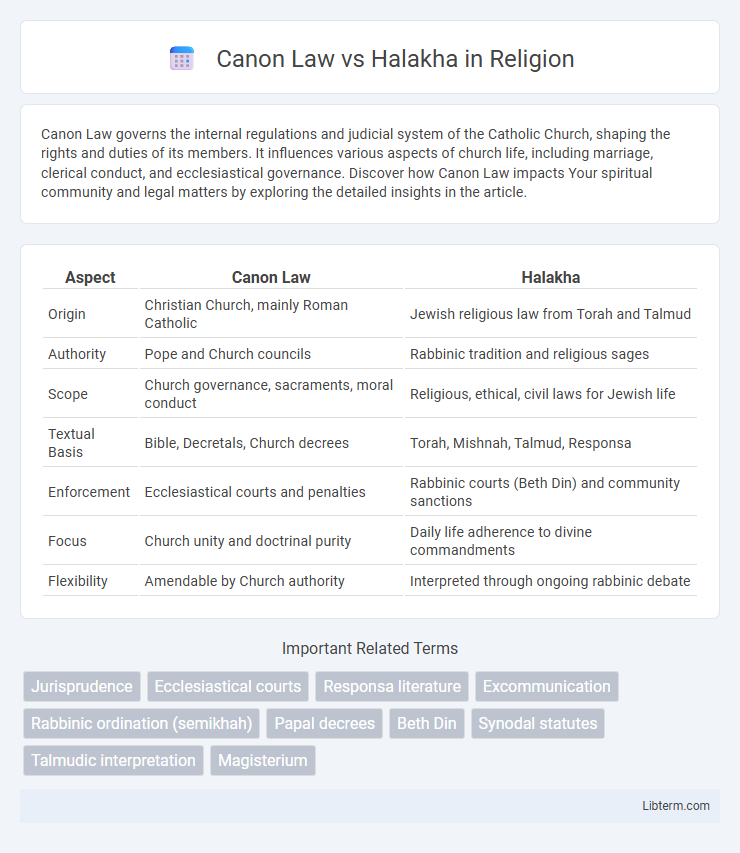Canon Law governs the internal regulations and judicial system of the Catholic Church, shaping the rights and duties of its members. It influences various aspects of church life, including marriage, clerical conduct, and ecclesiastical governance. Discover how Canon Law impacts Your spiritual community and legal matters by exploring the detailed insights in the article.
Table of Comparison
| Aspect | Canon Law | Halakha |
|---|---|---|
| Origin | Christian Church, mainly Roman Catholic | Jewish religious law from Torah and Talmud |
| Authority | Pope and Church councils | Rabbinic tradition and religious sages |
| Scope | Church governance, sacraments, moral conduct | Religious, ethical, civil laws for Jewish life |
| Textual Basis | Bible, Decretals, Church decrees | Torah, Mishnah, Talmud, Responsa |
| Enforcement | Ecclesiastical courts and penalties | Rabbinic courts (Beth Din) and community sanctions |
| Focus | Church unity and doctrinal purity | Daily life adherence to divine commandments |
| Flexibility | Amendable by Church authority | Interpreted through ongoing rabbinic debate |
Introduction to Canon Law and Halakha
Canon Law and Halakha represent two distinct legal systems rooted in the religious traditions of Christianity and Judaism. Canon Law governs the organizational, liturgical, and moral framework of the Catholic Church, codified primarily in the Code of Canon Law, while Halakha comprises Jewish religious laws derived from the Torah, Talmud, and rabbinic writings. Both systems provide comprehensive guidelines for religious practice, ethical conduct, and community governance, reflecting their respective theological foundations and cultural histories.
Historical Origins and Development
Canon Law originated in the early Christian Church, evolving from Roman legal principles and ecclesiastical decrees established between the 4th and 12th centuries, with significant codifications such as Gratian's Decretum in the 12th century. Halakha, rooted in the ancient Hebrew Bible and Talmudic teachings, developed over centuries through rabbinic interpretation and oral traditions, formalizing Jewish religious laws from the Second Temple period through the Middle Ages. Both legal systems reflect distinct religious, cultural, and historical contexts, shaping their unique jurisprudential frameworks and communities' religious life.
Foundational Texts and Sources
Canon Law is primarily based on the Code of Canon Law and the Clementine and Gregorian Decretals, which codify ecclesiastical legislation for the Roman Catholic Church. Halakha derives from the Torah, Talmud, and Mishnaic texts, supplemented by rabbinic responsa and later legal codes such as the Shulchan Aruch. Both systems rely on authoritative writings but differ in textual origins and interpretive traditions shaping their respective religious legal frameworks.
Authority Structures and Leadership
Canon Law is governed by hierarchical authority centralized in the Pope and the Roman Curia, with bishops overseeing dioceses and enforcing ecclesiastical regulations. Halakha operates through decentralized rabbinic leadership, where authoritative interpretations are derived from Talmudic scholars and various rabbinic courts (Beth Din) within different Jewish communities. While Canon Law emphasizes a unified top-down structure, Halakha relies on localized, interpretative rulings by diverse rabbinic authorities.
Legal Interpretation and Decision-Making
Canon Law relies on systematic interpretation of ecclesiastical statutes, emphasizing papal authority and church councils in decision-making processes. Halakha employs Talmudic exegesis and rabbinic precedents, prioritizing oral tradition and collective rabbinic consensus for legal rulings. Both systems integrate textual analysis and authoritative interpretation, yet differ in sources and hierarchical structures guiding their jurisprudence.
Areas of Jurisdiction and Application
Canon Law governs the organizational structure, liturgical practices, and doctrinal adherence within the Roman Catholic Church, primarily applying to clergy and laity under its ecclesiastical authority. Halakha encompasses religious, civil, and ethical laws derived from the Torah and Talmud, guiding all aspects of life for observant Jews across various communities worldwide. The jurisdiction of Canon Law is confined to internally regulating church members, while Halakha extends broadly to personal status, dietary laws, and communal regulations, affecting both individual behavior and community governance.
Rituals, Ethics, and Daily Life
Canon Law and Halakha govern religious rituals, ethics, and daily life with distinct frameworks rooted in Christianity and Judaism, respectively. Canon Law prescribes structured liturgical practices and moral directives within the Catholic Church, emphasizing sacramental rituals and ecclesiastical discipline. Halakha details comprehensive ethical laws and ritual observances that shape every aspect of Jewish daily life, from dietary rules to Sabbath observance, reflecting an all-encompassing legal system based on the Torah and rabbinic interpretations.
Conflict Resolution and Legal Enforcement
Canon Law emphasizes hierarchical adjudication with ecclesiastical courts enforcing church doctrines, relying on clerical authority for conflict resolution and maintaining discipline within the Christian community. Halakha operates through rabbinic interpretation and communal consensus, prioritizing restorative justice and ethical obligations derived from Torah law to resolve disputes and enforce religious norms. Both systems integrate religious principles with legal procedures, though Canon Law enforces centralized ecclesiastical authority while Halakha depends on decentralized rabbinic rulings and community enforcement.
Adaptation to Modernity and Societal Change
Canon Law exhibits structured mechanisms for adaptation through papal decrees and ecumenical councils, enabling responsive updates to modern ethical and social issues within the Catholic Church. Halakha relies on rabbinic interpretation and responsa literature to address contemporary challenges, emphasizing continuity with traditional Jewish legal principles while allowing flexibility in applications. Both systems balance fidelity to foundational texts with evolving societal norms, but Canon Law tends to formalize changes through centralized authority, whereas Halakha often depends on decentralized rabbinic opinions.
Comparative Influence on Religious Communities
Canon Law shapes the organizational structure and hierarchical governance of the Roman Catholic Church, influencing millions of adherents worldwide through codified legal norms. Halakha governs Jewish religious life, deeply integrating legal, ethical, and ritual aspects to maintain community cohesion and identity across diverse Jewish populations. Both legal systems profoundly impact their respective religious communities by defining moral conduct, worship practices, and dispute resolution mechanisms.
Canon Law Infographic

 libterm.com
libterm.com